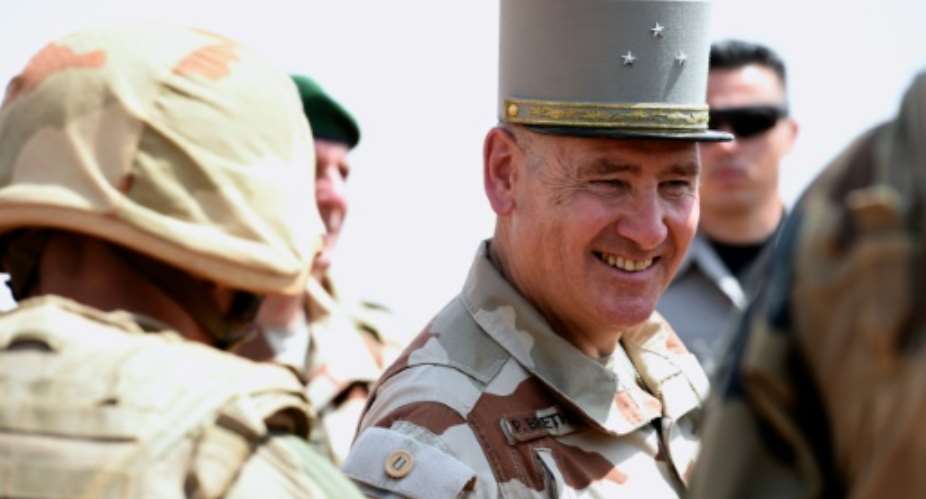N'Djamena (AFP) - The commander of a French anti-jihadist force in Africa's northern Sahel says Islamist insurgents are hitting soft targets elsewhere after losing the initiative in the region.
General Patrick Brethous said groups were now selecting easy targets beyond the reach of his Operation Barkhane because they had been outmanoeuvred on home turf.
"It's perhaps precisely because they are under pressure that they (jihadist groups) do that. They have no sanctuaries left, just a few hideouts in the far north," he told AFP in an interview at the headquarters of Operation Barkhane in Chad's capital N'Djamena.
Brethous cited a March 13 attack -- claimed by Al-Qaeda in the Islamic Maghreb -- in Ivory Coast's Grand-Bassam beach resort that killed 19 as an example.
Other recent attacks out of Operation Barkhane's range include another AQIM-claimed attack, the November 2015 raid on the Radisson Blu in the Malian capital Bamako that left 20 people dead, including 14 foreigners.
In January, 30 people were also killed, including many foreigners, in an attack on a top Burkina Faso hotel and a nearby restaurant in the capital Ouagadougou.
France's Operation Barkhane, launched in 2014, has seen 3,500 soldiers deployed across parts of five countries in the Sahel region -- Burkina Faso, Chad, Mali, Mauritania and Niger -- to maintain cross-border security following the ousting of jihadists from key towns in Mali's north.
It is the successor to a military intervention that freed Mali's vast, desolate north from the control of Tuareg-led rebels who allied with jihadist groups linked to Al-Qaeda in 2012.
Security, meanwhile, has been beefed up in Accra and Lome following a leaked intelligence report that indicated Islamist militants were likely to launch their next attacks in Ghana and Togo.
Brethous said that in northern Mali, where French troops helped to drive Islamist insurgents out of key towns in 2013, armed groups no longer had "structured combat units, except perhaps for Ansar Dine".
Three French soldiers were killed in northern Mali on April 12 when their vehicle struck a mine, bringing to seven the number of men killed among the ground and air forces deployed since August 2014, according to France's defence ministry.
"We are at war, we've taken a blow and there will be others," the general said, adding, however, that such isolated incidents gave a misleading impression of the overall gains being made.
"We don't communicate much about the number of bombs dropped, enemies eliminated. However, when there are deaths on our side, this is known. It can give the impression that we've just lost the initiative, but this isn't so," he said.
Improvised mines were now the main risk in the desert territory, where the Islamists still have explosives and money from trafficking rackets to pay young boys to lay the bombs, he added.
"The threat remains residual, but a nuisance factor is still there," he said.
Asked how 3,500 troops could cover an area the size of Europe, Brethous said he favoured staging attacks in the "third dimension", where ground troops backed by airborne intelligence could take Islamists by surprise.
"Three-D enables us to inform and then to guide ground units, from choppers to armoured vehicles to the pick-up trucks of our Nigerien friends (the army of Niger), to intercept columns or carry out operations with commando teams."
Squads of soldiers were sent "for entire weeks into the desert to be in contact with the population and deny the enemy any freedom of manoeuvre, and the ability to levy taxes, to recruit and to rest," he added.
"I alleviate (limited military resources) by concentrating efforts into major operations. This way, during an operation I have good means and I can surprise the adversary," he said.





 Saglemi Housing Project will not be left to rot – Kojo Oppong Nkrumah
Saglemi Housing Project will not be left to rot – Kojo Oppong Nkrumah
 Transport fares hike: GPRTU issue two-day ultimatum
Transport fares hike: GPRTU issue two-day ultimatum
 ARC endorses Alan as presidential candidate – Buaben Asamoa
ARC endorses Alan as presidential candidate – Buaben Asamoa
 Akufo-Addo appoints Kwasi Agyei as new Controller and Accountant-General
Akufo-Addo appoints Kwasi Agyei as new Controller and Accountant-General
 PNC dismiss reports of mass resignations
PNC dismiss reports of mass resignations
 PAC advocates for revenue collectors to be engaged on commission basis, not full...
PAC advocates for revenue collectors to be engaged on commission basis, not full...
 Genser Energy commissions 110km of natural gas pipeline at Anwomaso
Genser Energy commissions 110km of natural gas pipeline at Anwomaso
 Naa Torshie calls for tolerance, peace ahead of 2024 election
Naa Torshie calls for tolerance, peace ahead of 2024 election
 Asantehene commends Matthew Opoku Prempeh for conceiving GENSER Kumasi Pipeline ...
Asantehene commends Matthew Opoku Prempeh for conceiving GENSER Kumasi Pipeline ...
 Let’s do away with ‘slash and burn politics’ in Ghana — Dr Adutwum
Let’s do away with ‘slash and burn politics’ in Ghana — Dr Adutwum
